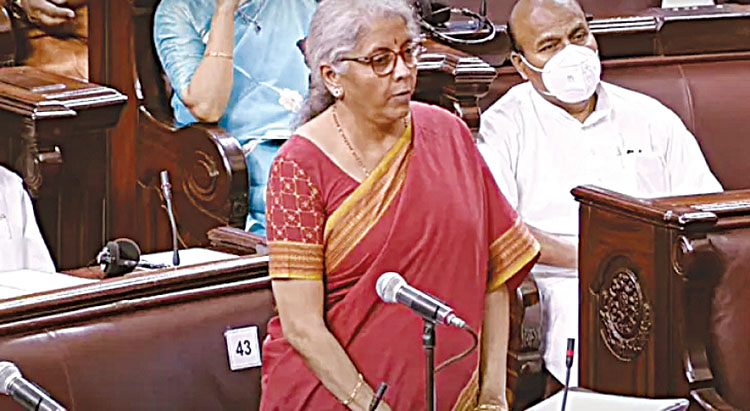New Delhi, March 29 (FN Agency) Finance Minister Nirmala Sitharaman on Tuesday said there was no ‘us’ versus ‘them,’ when it comes to the government and the private sector. Replying to the discussion on Finance Bill, 2022 and Appropriation Bill, 2022 in the Rajya Sabha, the Minister said she was at odds with the suggestion that the government had lost faith in private sector. The Minister said that schemes like production-linked incentive (PLI) and GatiShakti would boost private investment. “The pandemic created huge uncertainties. That seriously impacted private sector investments. The government stepped in to fill the gap and create an environment necessary to revive and sustain investments from the private sector. “We believe that government and private sector are partners in ushering development in the economy.
There is no ‘us’ versus ‘them’ when it comes to government versus private sector,” Sitharaman said, countering senior Congress leader and former Finance Minister P Chidambaram. The Rajya Sabha on Tuesday returned the Finance Bill, 2022 and Appropriation Bill, 2022, following Minister’s reply to the discussion on two crucial Money Bills. While replying to the discussion, Sitharaman said the government has launched PLI in 14 sectors, which is expected to add additional productive capacity of over Rs 30 lakh crore in the next five years. On the comment made by Chidambaram that the Finance Bill had too many amendments, Sitharaman said the remark was made with a tinge of criticism and sarcasm. She said compared to 125 sections in the Finance Bill, 2022 presented in Parliament, the Finance Bill of 2012 had 156 sections, out of which 113 belonged to direct taxation. Participating in the discussion, Chidambaram had said that Finance Bill 2022 had 125 clauses, of which 84 pertained to amendments to the Income Tax Act, and the Finance Minister had moved 39 amendments, adding that it was difficult for him to understand the amendments even after careful perusal. Sitharaman, however, noted that the amendments brought by the government were because of consultative approach adopted by it. “So far as government (amendments) are concerned, we consult and bring in amendments.
This is because we consult the stakeholders, come back and if necessary improve on it and bring in amendments. That’s why 39 amendments have been brought in,” the Finance Minister said. “In Finance Act 2009, there were 117 sections out of which 84 belonged to direct taxation. Very comparable. In Finance Bill of 2012 there were 156 sections out of which 113 belonged to direct taxation. So, comparable sir,” she noted. On questions raised by the Opposition members over treatment of debt repayment of Air India as capital investment, Sitharaman said that as per accounting principle, loans to any CPSE or loans to states are all treated as capital expenditure. Responding to issues raised around growth and inflation, the Minister said that the government is conscious of the need to balance the imperative of growth and also make sure India’s recovery post the Covid is sustained and sustainable. She stated that while giving emphasis for growth, the government was conscious of inflation.
On the contention that nominal growth for FY23 was pegged at 11.1 per cent, leading to inflation only being three per cent during the year, Sitharaman said she was hopeful that inflation would ease going forward. As regards the projection made by the Chief Economic Advisor (CEA) about GDP growth, inflation and state of economy, Sitharaman said the Finance Ministry keeps that report at an arm’s distance. “The Chief Economic Advisor, yes he is part of the Ministry, but his report and assessments are normally his own. The Ministry keeps that report at an arm’s distance, which is something all of us know and am sure the party from where he (Chidambaram) comes and he has been Finance Minister, he would appreciate that point,” the Minister said. Sitharaman said the government has been responding to the disruption caused by Russia-Ukraine crisis and a resultant increase in prices of global oil.

